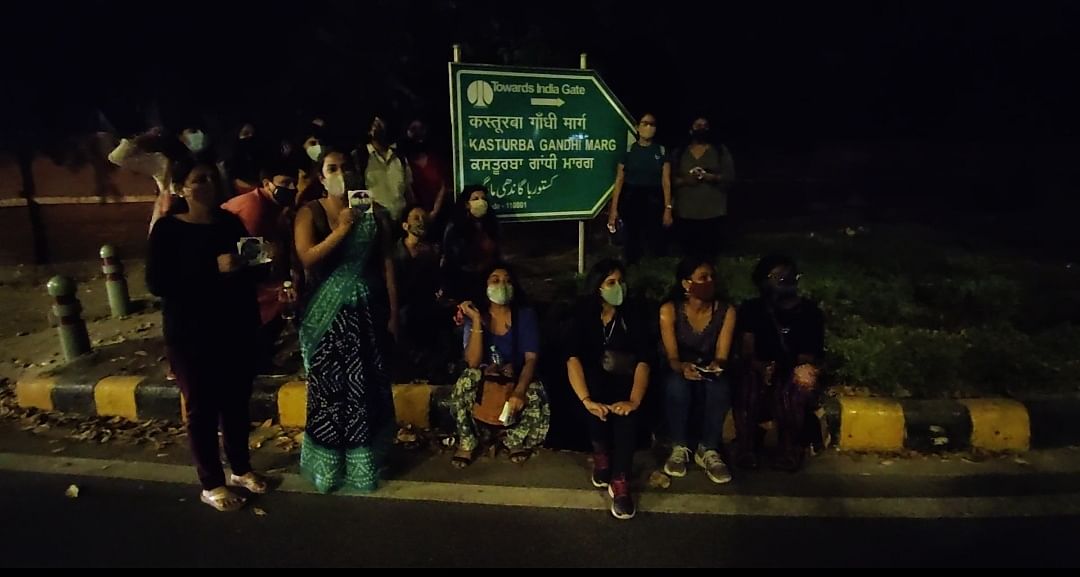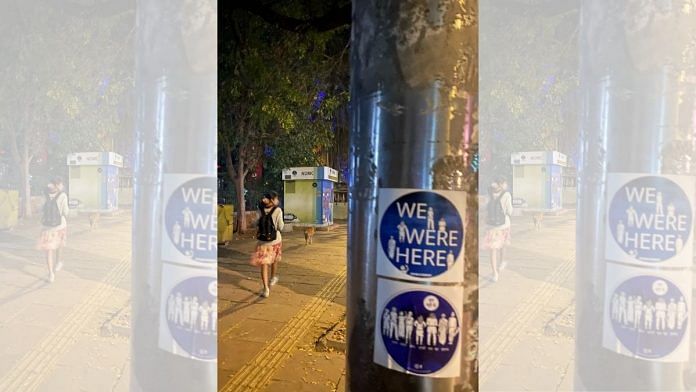New Delhi: There is an unspoken rule that the women of this country follow religiously: avoid walking when it gets dark, and definitely don’t venture out on your own. Women tend to automatically restrict themselves to their homes post sundown to stay safe. This is evident in public spaces — women’s presence on roads, metros, buses and shops steadily shrinks as it gets dark.
To reclaim the freedom of public spaces at night, a group of women chose a simple act — to take a walk on International Women’s Day.
About 30 women gathered at Indira Chowk at A Block in Connaught Place at 10:30 pm Monday and walked almost 8 km, tracing roads in central Delhi named after women. They started at Indira Chowk, going to Kasturba Gandhi Marg and concluded the walk at Amrita Shergill Marg. Over here, the group read poems by women artists.
“Some roads that we couldn’t cover are Justice Sunanda Bhandare Road, Rani Jhansi road in Jhandewalan, Mata Sundri road near Barakhamba, Mother Teresa Road Crescent Marg,” said Meghna Singh, a member of Women Walk at Midnight, a Delhi-based group that organises such late night walks.
On their walk, the women left a trail of stickers that read ‘We Were Here’ on trees, walls and bus stops as a way of stating public spaces are as much meant for women as they are for men.

The group also noted how difficult it could be to name 10 roads named after women in the capital of India.
One of the participants, Aditi Yagnik, who works with the NGO SEWA, chose to put her sticker on a board saying ‘No photos’.
“We usually get to hear a stern ‘no’ to everything. So I’m saying yes to photos, yes to walking the streets at night, yes to every damn thing,” she told ThePrint.
The group mostly consisted of women in their 20s and 30s who discussed the issues they’ve faced in their homes and recounted stories of their own small acts of resistance, making friends of strangers through shared struggles. In the background, old Hindi music was being played that the group would occasionally sing along to.
“I have lived in Delhi for almost five years now, and yet I have never taken a walk outside my neighbourhood unescorted by a man,” Ankita, a journalism student at the Asian Academy of Film and Television in Noida said. “I am absolutely loving Central Delhi right now, it’s so lively!”
Another participant, Deepshikha Mishra, a lawyer and theatre artist, talked about her fear of taking cabs.
“You know, late at night I prefer autos over taxis, because if something ever happens, autos at least give me a chance to jump out of them,” she told ThePrint.
“When I had first come to Delhi about five years ago, I took a cab from CP to South Extension, and even though I didn’t know Delhi roads that well, I quickly realised both the places aren’t half an hour apart. The cabbie took me someplace else altogether,” she said.
“I tried opening the car doors but they had child lock on, (and) the driver refused to stop even though I asked him to over and over again. On top of everything, I lost network. Finally when I did get network and dialled 100, the guy stopped. I don’t know what his intentions were. But by that time, we were at Lado Sarai, way off the route. I can never take cabs alone now, even in the afternoon,” she added.
Ishita Mehra, a consultant in the education sector in eastern Ladakh, also talked about her fear of walking at night.
“After today’s walk, I realised how internalised my fear of the night is. I had never even thought about venturing out alone at night, let alone feel frustrated by the lack of having that option. I had never sat on the footpath with friends or whatever at 1 am in the night. I feel free today … it’s been a liberating experience,” she said.
Also read: Right to reputation vs woman’s right to dignity — what court said in Akbar-Ramani verdict
Women walk at midnight
‘Women Walk at Midnight’ has been active since 2017, encouraging women to form groups to go on walks late at night. The size of the groups vary from as few as four to around 50.
The women coordinate on the messaging app Signal and announce walking events on Facebook and Instagram.
At least one late night walk is organised a month, typically in a locality participants stay in, but the occasional special walk is planned to mark days such as Women’s Day, the anniversary of the 2012 Delhi gang rape (16 December) and Gandhi Jayanti.
Some of the localities that have been covered include CR Park, Hauz Khas, Vasant Kunj, Shahdra, Pitampura, Moti Bagh and Jangpura.
The idea for ‘Women Walk at Midnight’ was conceived when Mallika Taneja, a theatre artist, had decided to embark on a 24-hour-long walk across Delhi about four years ago. Her plan had only one problem — it could potentially be dangerous for her to walk alone.
“At that time, I put out a call for people to walk with me, and people showed up. That time men, women, everyone came together to join me on my walk. Slowly it evolved to become ‘Women Walk at Midnight’ and now we’re a bunch of volunteers, who put this together regularly,” she told ThePrint. “Not only are these walks a fun thing to do, it’s also a form of resistance when we leave our trace on the roads of the city,” she said.
When asked if the group faced any unpleasant or untoward incidents while on these walks, Taneja said, “Sometimes you get followed, sometimes you are catcalled. Often cops stop us to enquire where we are going … I mean, it’s Delhi. Anything you can expect to happen here has happened.”
Also read: I went undercover with women social media extremists. They want traditional roles to return




Very nice, such a heartwarming news. May Delhi become the safest place on Earth for women.
More power to women!